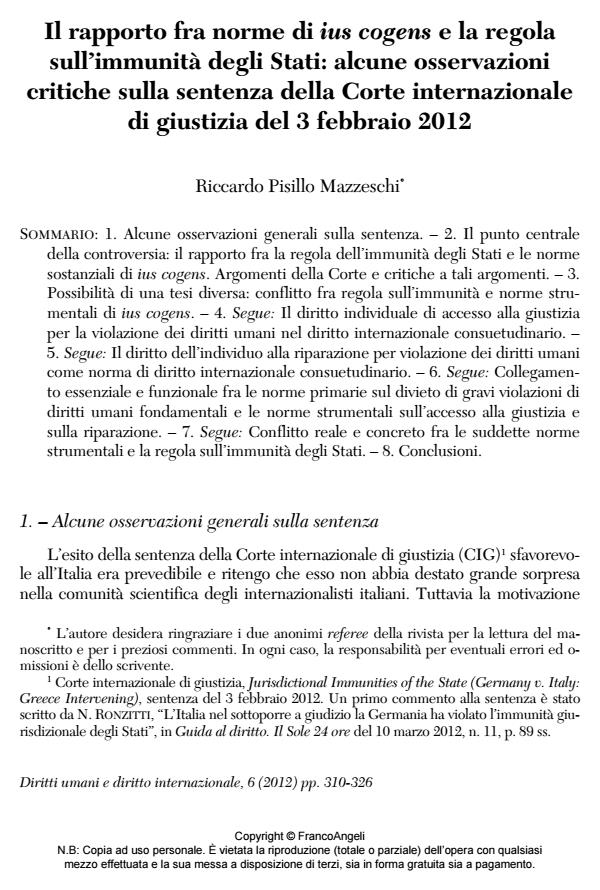The relationship between ius cogens and foreign States’ immunity: some critical remarks on the judgment of the International Court of Justice of 3 February 2012
Journal title DIRITTI UMANI E DIRITTO INTERNAZIONALE
Author/s Mazzeschi Riccardo Pisillo
Publishing Year 2012 Issue 2012/2
Language Italian Pages 17 P. 310-326 File size 208 KB
DOI 10.3280/DUDI2012-002004
DOI is like a bar code for intellectual property: to have more infomation
click here
Below, you can see the article first page
If you want to buy this article in PDF format, you can do it, following the instructions to buy download credits

FrancoAngeli is member of Publishers International Linking Association, Inc (PILA), a not-for-profit association which run the CrossRef service enabling links to and from online scholarly content.
The ICJ judgment concerning jurisdictional immunities of the State (Germany v. Italy) is disappointing both for its general approach and for its legal grounds. It shows a traditional, positivistic, conservative and state-centered conception of international law and does not offer any opening towards a progressive development of such law. Moreover some legal arguments of the Court are not convincing. In particular, the Court does not deepen the main issue of the dispute, that is, the possible conflict between the customary norm on foreign State immunity and the customary norms on prohibitions of war crimes and of crimes against humanity by all States, which belong to ius cogens. But the Court avoids dealing with the problem of ius cogens, by simply stating that there is no conflict between the former and the latter norms, because "the two sets of rules address different matters". This argument is quite formalistic and is not convincing, because the procedural character of the rule on immunity does not prevent the judge from dealing with the merits of the dispute, by establishing the nature of the State conduct and the possible existence of an exception to immunity. In any case, the argument of the Court could have been overcome by maintaining that: 1) contemporary international law provides for two customary rules giving the individual victim a right of access to justice and a right to obtain reparation when he suffered war crimes and crimes against humanity committed by a State; 2) these rules do not have, usually, a peremptory character, but they become peremptory when they are absolutely the only means to redress the breach of a ius cogens rule, such as the prohibition of war crimes and of crimes against humanity; 3) in such a case, there is a true conflict between the instrumental and peremptory rules on access to justice and reparation and the rule on State immunity; 4) this conflict cannot be avoided by saying that the two sets of rules address different matters; 5) the conflict should be solved through the predominance of the rules on access to justice and reparation over the rule on State immunity, because customary norms of ius cogens prevail over simple customary norms. Perhaps the International Court of Justice was not ready to accept these arguments, which aim at strengthening the role of human rights, of the individual and of ius cogens in contemporary international law. But the Court could, at least, have dealt more closely with them and paid some attention to the progressive development of international law.
- Civil actions for damages caused by war crimes vs. State immunity from jurisdiction and the political act doctrine: ECtHR, ICJ and Italian courts Francesco De Santis di Nicola, in International Comparative Jurisprudence /2017
DOI: 10.1016/j.icj.2017.02.002 - Sovereign Immunity Under Pressure Elisa Ruozzi, pp.247 (ISBN:978-3-030-87705-7)
- Encyclopedia of Contemporary Constitutionalism Egeria Nalin, pp.1 (ISBN:978-3-319-31739-7)
Mazzeschi Riccardo Pisillo, Il rapporto fra norme di ius cogens e la regola sull’immunità degli Stati: alcune osservazioni critiche sulla sentenza della Corte internazionale di giustizia del 3 febbraio 2012 in "DIRITTI UMANI E DIRITTO INTERNAZIONALE" 2/2012, pp 310-326, DOI: 10.3280/DUDI2012-002004